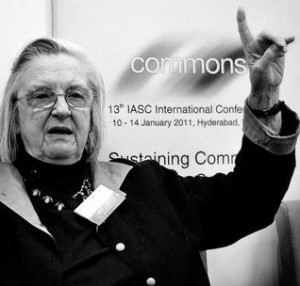Commons Champion
R.I.P. Elinor Ostrom (1933-2012), Advocate for Shared Resources
by Jay Walljasper
Elinor Ostrom, who shared the 2009 Nobel Prize in economics for her lifelong work studying how communities share resources, died June 12. She was 78.
 The only woman out of 69 Nobel Laureates in economics honored since 1969, Ostrom taught political science at Indiana University.
The only woman out of 69 Nobel Laureates in economics honored since 1969, Ostrom taught political science at Indiana University.
In research conducted throughout the world, she increased our understanding of how commons function in a wide variety of communities. Ostrom’s work also debunked the Tragedy of the Commons — the widespread idea that shared resources inevitably end in environmental and economic ruin
This international acclaim for her work was heralded in many developing nations as evidence that their commons-based traditions of cooperation and communal resources was not a violation of basic economic common sense, as many Western economic advisers warned. Kenyan economist Korir Sing’Oei predicted that Ostrom’s prize would prove more significant for Africans than that of Barack Obama, the son of a Kenyan father who won the Nobel Peace Prize the same year.
In contrast to the theoretical approach of many economists, “She would go and actually talk to Indonesian fisherman, or Maine lobstermen, and ask, ‘How did you come to establish this limit on the fish catch? How did you deal with the fact that people might try to get around it?’†said Nancy Folbre, an economics professor at the University of Massachusetts, Amherst in the New York Times obituary
All of us at On the Commons feel privileged to have co-sponsored Professor Ostrom’s appearance last fall at the Festival of the Commons held at Augsburg College in Minneapolis. Listening to her speak with students, we learned the large role feminism played in the development of her thinking. We also discovered that in addition to natural resources she had done intensive investigations into social commons such as local police forces. Her research helped stem the trend toward consolidating law enforcement operations into large forces covering many communities.
This theme carried over into her keynote address at the festival in which she advocated a “polycentric†approach to commons management involving oversight “at multiple levels with autonomy at each level.†The chief virtue and practical value of this structure, she explained, is that it helps establish rules that “tend to encourage the growth of trust and reciprocity†among people who use and care for a particular commons.
She cited a comprehensive study of 100 forests in 14 countries that details how the involvement of local people in decisionmaking is more important to successfully sustaining healthy forests than who is actually in charge of the forests.
This was also the subject she chose to address in the last article she published while alive, about the Rio+20 global environmental conference that was posted on the Project Syndicate website yesterday While acknowledging the dire need to protect the planet from environmental ruin, she declares “a single international agreement would be a grave mistake. We cannot rely on singular global policies to solve the problem of managing our common resources: the oceans, atmosphere, forests, waterways, and rich diversity of life that combine to create the right conditions for life, including seven billion humans, to thrive.â€
“Success will hinge on developing many overlapping policies to achieve the goals,†she said, adding that “We have a decade to act before the economic cost of current viable solutions becomes too high. Without action, we risk catastrophic and perhaps irreversible changes to our life-support system.â€
We are saddened by the loss of this profound teacher at precisely the time when the world most needs to hear her wisdom. But are committed to help spread her message alongside many others whose lives she has touched.
Jay Walljasper is co-editor of On the Commons, and is the author of the book All That We Share: A Field Guide to the Commons (The New Press, 2010). He is a Contributing Editor at National Geographic Traveler, a Senior Fellow of the Project for Public Spaces, and a Contributing Author for New Clear Vision.
